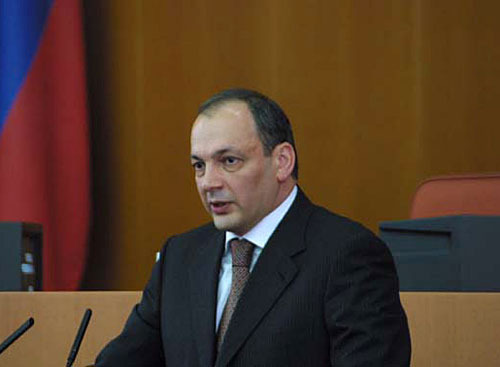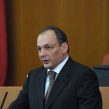
Voters’ Low Interest in Elections Casts Doubt on Their Legitimacy
Publication: Eurasia Daily Monitor Volume: 8 Issue: 52
By:

On March 13, Dagestan and Adygea elected their respective regional parliaments. There were reports of serious violations of electoral rules from both republics. At the same time, sources reported an extremely low turnout of the voters, which may indicate a growing political crisis. There are two days designated by Russian legislation for holding all elections, one in the spring and the other in the fall. According to the Russian non-profit association for voters’ rights, 10 percent of all complaints across Russia during these elections came from Adygea (www.kavkaz-uzel.ru, March 13). In Adygea, 457 candidates sought election to the republic’s 54-seat parliament (www.kavkaz-uzel.ru, March 11). In Dagestan, 1083 candidates ran for the seats in the 90-member parliament of the republic (www.kavkaz-uzel.ru, March 14).
On February 13, Khajimos Kachetsukov, a candidate for a seat in Adygea’s regional parliament from the Just Russia party, was gunned down in the republic’s principal town Maikop. Authorities said the murder was related to Kachetsukov’s previous business activities. However, the attack on a party candidate in quiet Adygea came as a stark reminder of increasing volatility in North Caucasus politics (www.kavkaz-uzel.ru, March 3). On March 11, the car of a Russian Communist Party candidate running for a seat in Dagestan’s regional parliament, Alibulat Gasanov, came under fire. The candidate was wounded but survived; his brother, however, died in the attack (www.kavkaz-uzel.ru, March 12).
In Adygea the ruling United Russia party received 58 percent of the vote, 13 percent down from 2007, when it received 71 percent. The communists received 19 percent of the vote, while the Liberal Democrats (aka Zhirinovsky’s party) and the Just Russia party each received 10 percent (www.kavkaz-uzel.ru, March 14). In Dagestan, United Russia received the same percentage of the vote – 66 percent – as in the 2007 elections, while the Patriots of Russia party and the Just Russia party each received 11 percent and the communists received 9 percent. Others performed below the threshold that would have allowed them to win seats in the regional parliament (www.kavkaz-uzel.ru, March 14).
Several cases of fistfights near the ballot boxes and ballot-stuffing were reported in Dagestan during the elections and vote counting. The chairman of the independent union of businessmen and drivers of Dagestan, Isalmagomed Nabiev, told the Kavkazsky Uzel (Caucasian Knot) website that voter turnout was extremely low in Makhachkala. Nabiev said he spent all day at one of the ballot stations in Makhachkala as an observer and counted 131 visitors, or 6.6 percent of the registered voters at the district. “There is no doubt [that] the elections throughout the capital of Dagestan [Makhachkala] went according to the same scenario, while the republican electoral commission reports a turnout of about 80 percent.” On Election Day, a Kavkazsky Uzel reporter visited several ballot stations in Makhachkala and saw not a single visitor during his visits. Even the head of the electoral commission admitted that for half of the day his ballot station received only 100 voters (www.kavkaz-uzel.ru, March 14).
Dagestan’s President, Magomedsalam Magomedov, hailed the parliamentary elections which, according to him, proceeded in accordance with existing legislation and without any major problems (www.riadagestan.ru, March 13). On March 15, President Magomedov met the deputy commander of the Russian Interior Ministry troops, General Yevgeny Lazebin, and several other Russian military officials. Magomedov thanked the Interior Ministry troops “for providing conditions for the electoral campaign to conclude peacefully and orderly.” General Lazebin, in his turn, stated that he received “clear orders to increase [the troops’] level of alert, but avoid a confrontation with the civilian population [in Dagestan]” (www.riadagestan.ru, March 15). The massive presence of the Russian troops in Dagestan may have contributed to the relative peacefulness of the Dagestani elections, but it hardly made them more legitimate, if turnout really was as low as reported by observers.
Meanwhile, United Russia reported significant losses in the majority of the electoral districts throughout the Russian Federation. At the same time, several Russian regions, like Tambov and Chukotka, displayed “North Caucasian” electoral behavior, with authorities reporting a clearly fictitious voter turnout of turnout of 90 percent. In fact, some Russian regions, like the Nizhny Novgorod region, were even more oppressive against independent organizations monitoring the elections than the authorities in Dagestan and Adygea. Experts warned that the old electoral techniques used by the United Russia party to win elections were wearing thin, increasingly ineffective and even harmful to the party itself (www.gazeta.ru, March 14).
In Dagestan, the public continues to discuss the effects of the Arab revolutions in North Africa. The popular Dagestani observer Akhmednabi Akhmednabiev warned that the republican intelligentsia’s optimism that a revolution in Dagestan is in the offing is premature. He noted wistfully that the Arabs are able to peacefully overthrow their governments in North Africa while the level of development of civil society back home in Dagestan is low. “Our [Dagestani] courage is very peculiar,” Akhmednabiev said. “Of course, each person in the republic is ready to fight anyone to the death; if, for instance somebody pushed him in the street accidentally or said to him something unpleasant … But our courage evaporates when it comes to [defending] the common interests of the whole Dagestan” (www.ndelo.ru, March 11).
The apparently “quiet and orderly” parliamentary elections in Dagestan, in which fewer than 10 percent of the voters participated, may in fact be the most palpable judgment of the current political regime in the country and in this particular republic. The high degree of the public’s separation from political life can hardly last for a very long time in Dagestan. If it does, the republic is doomed to endure instability and export violence to other regions of the Russian Federation.




